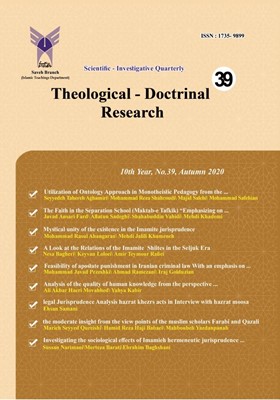the moderate insight from the view points of the muslim scholars Farabi and Qazali
Subject Areas : Islamic theologyHamidreza Hajibabaeei 1 , Mahboubeh Yazdanpanah 2
1 - University of Tehran
2 - University of Tehran
Keywords:
Abstract :
The present study was conducted with the aim of explaining the moral boundary from the viewpoint of Islamic scholars (Farabi, Ibn Maskawayh, Imam Mohammad Ghazali and Mohammad Naraghi). The research method was library study type. The library research method is used in all scientific research, and in some of them the subject of research in terms the method, from the beginning to the end, is based on the findings of the library research. In this group of researcher's researches, one should study literature and subject matter and research subject. In the present research, the researcher, in order to explain the moral boundary according to the method of library study, is one of the most important foundations and components related to the moral boundary that includes goodness, happiness, power, moderation, virtues and vices, from the perspective of great philosophers Islamic (including al-Farabi, al-Ghazali), which is largely a follower of Aristotle and Plato. In connection with the general results of the explanation of the moral boundaries, it can be said that Farabi's, Imam Mohammad Ghazali and Mohammad Naraghi's views are very similar to Aristotle's school and have not had a particular initiative in explaining the moral norms, but Ibn Meshkui's views and ideas, especially in the subject of moderation There have been innovations that followed the pure pursuit of Aristotle and Plato. Finally, the researcher in the form of the present research has discussed the above in the further research, which includes the first to fifth chapters of the study, in detail.
قرآن کریم
اترک، حسین؛ وظیفه گرایی اخلاق؛ مجله اخلاق در علوم و فناوری، شماره 13، بهار و تابستان، 1389
احمدپور؛ مهدی و همکاران؛ کتاب شناخت اخلاق اسلامی؛ قم انتشارات پژوهشگاه علوم و فرهنگ اسلمی، 1386.
ارسطو؛ اخلاق نیکوماخس؛ ترجمه ابوالقاسم پورحسینی،تهران، انتشارات دانشگاه تهران 1381
سید قریشی ماریه (1390)؛پاسخ به برخی انتقادات وارد شده ب حد وسط در اخلاق ارسطویی بر اساس تبیینی صحیح از این نظریه؛مجله اندیشه دینی،شماره 38.
سید قریشی ماریه (1393) ؛اخلاق عقلی و فلسفی ؛اخلاق ارسطویی، تهران، نشر راشدین.
غزالی ابو حامد محمد بن محمد؛ میزان العمل؛ بیروت، دارالکتاب العلیه، 1409 ق.
غزالی؛ محمد ؛کیمیای سعادت؛ تصحیح احمد آرام، چاپ هشتم، تهران، انتشارات گنجینه، 1381
غزالی؛ محمد؛ تهافت الفلاسفه یا تناقضگویی فیلسوفان؛ ترجمه علیاصغر حلبی؛تهران؛ انتشارات جامی؛ 1382
غزالى، محمد بن محمد،؛ إحیاء علوم الدین؛ ، بیروت، دارالکتب العربى، چاپ اول، بیتا.
فارابی ابونصر(1371) ؛السیاسةالمدینه؛ مترجم سجادی سید جعفر، تهران، انتشارات طبع و نشر، چاپ دوم.
فارابی ابونصر(1379) ؛ آرای اهل مدینه فاضله؛ مترجم سجادی سید جعفر، تهران، انتشارات طبع و نشر، چاپ دوم.
فارابی ابونصر(1388) ؛ فصول منتزعه؛تهران صداوسیمای جمهوری اسلامی، چاپ دوم.
فارابی ابونصر(1348) ؛احصاء العلوم؛ ترجمه حسین خدیو،جم، تهران، انتشارات بنیاد فرهنگ ایران.
فارابی، ابونصر؛ فصوص الحکم؛ افست، انتشارات بیدار.
فارابی؛ ابونصر؛ فصول متنزعه؛ تحقیق فوزی متری نجار؛ بیروت؛ دار المشرق، 1971
فارابی؛ التنبیه علی سبیل السعاده؛ در فارابی و راه سعادت؛ به کوشش قاسم حسن پور، ترجمه و مقدمه نواب مقربی، تهران؛ انتشارات بنیاد حکمت اسلامی صدرا، 1390
مک اینتایر، السدر؛ تاریخچه فلسفه اخلاق؛ ترجمه انشاءاله رحمتی؛ چاپ دوم؛ تهران؛ انتشارات حکمت، 1379
مک اینتایر، السید(1981) ؛درپی فضیلت؛ انتشارات دانشگاه نتردام، ویراست سوم: ۲۰۰۷. (ترجمه، حمدعلی شمالی و حمید شهریاری ، سال ۱۳۹۰ ، انتشارات سمت چاپ )
نراقی، محمد مهدی ؛جامع السعاداة؛(1431) ترجمه اخلاق اسلامی ، تهران حکمت ، چاپ نهم (1389).


